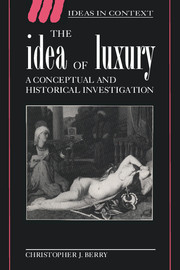7 - The historicity of needs
Published online by Cambridge University Press: 01 June 2011
Summary
In Chapters 5 and 6, in discussions of Barbon, Mandeville, Melon, Kames and Smith, I referred in passing to the notion that ‘luxury’ can change over time. This chapter explores a crucial implication of this notion. If past ‘luxuries’ have now become ‘necessities/needs’ it also means that the latter too are subject to temporal mutability. The significance of this implication can be appreciated when the role played by needs, as constituents of a ‘natural life’, is recalled. This role was to act as a normative benchmark upon desires. In contrast to the insatiability and fickleness of the latter, needs were held, by writers from Plato onwards, to possess the virtue of fixity and permanence. Once, however, needs themselves are seen to be capable of change then their traditional role appears to be jeopardised. Indeed the very idea that there are inherent ‘limits’ to the meeting of certain finite needs is displaced by an emphasis on change manifest as ‘progress’. The expansion of needs is a positive marker. In general terms, as an element of the so-called ‘historicist revolution’ of the late eighteenth and early nineteenth century, there is a shift from grounding norms in Space (the fixed natural life in terms of which change is corruption) to grounding them in Time (life is getting progressively better).
Chapter 8 will consider directly the normative relationship between needs and desires, as well as the practical and political aspects of the luxury-into-necessity dynamic as they apply in the contemporary world.
- Type
- Chapter
- Information
- The Idea of LuxuryA Conceptual and Historical Investigation, pp. 177 - 196Publisher: Cambridge University PressPrint publication year: 1994

